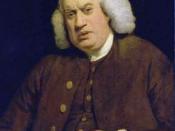Falstaff's Role in Henry IV, Part One
Henry IV, Part One, has always been one of the most popular of Shakespeare's plays, maybe because of Falstaff. Much of the early criticism I found concentrated on Falstaff and so
will I. This may begin in the eighteenth century with Samuel Johnson. For Johnson, the Prince is a 'young man of great abilities and violent passions,' and Hotspur is a 'rugged soldier,' but 'Falstaff, unimitated, unimitable Falstaff, how shall I describe thee? Thou compound of sense and vice . . . a character loaded with faults, and with faults which produce contempt . . . a thief, a glutton, a coward, and a boaster, always ready to cheat the weak and prey upon the poor; to terrify the timorous and insult the defenceless . . . his wit is not of the splendid or ambitious kind, but consists in easy escapes and sallies of levity [yet] he is stained with no enormous or sanguinary crimes, so that his licentiousness is not so offensive but that it may be borne for his mirth.'
Johnson makes three assumptions in his reading of the play:
1. That Falstaff is the kind of character who invites a moral judgment mainly that he can answer to the charge of being a coward.
2. That you (the reader) can detach Falstaff's frivolity from the play and it can exist for its own sake apart from the major theme of the drama.
3. That the play is really about the fate of the kingdom, and that you (the reader) do not connect Falstaff's scenes with the main action. This means that the play has no real unity.
Starting with Johnson's first assumption, I do agree with this. Any discussion of Falstaff is bound to include a judgement...


